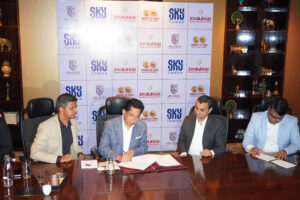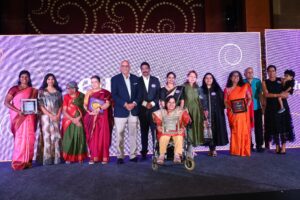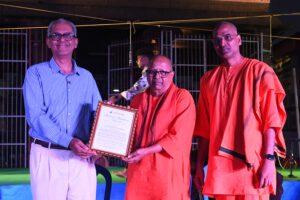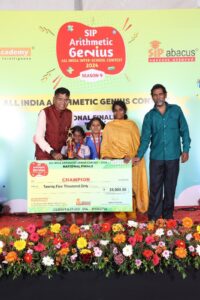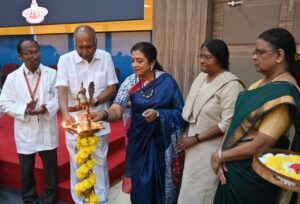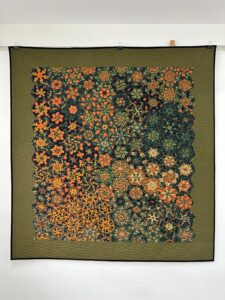‘Should law adapt to technology or should technology adapt to the norms of law?’ Asks Prof. Baxi
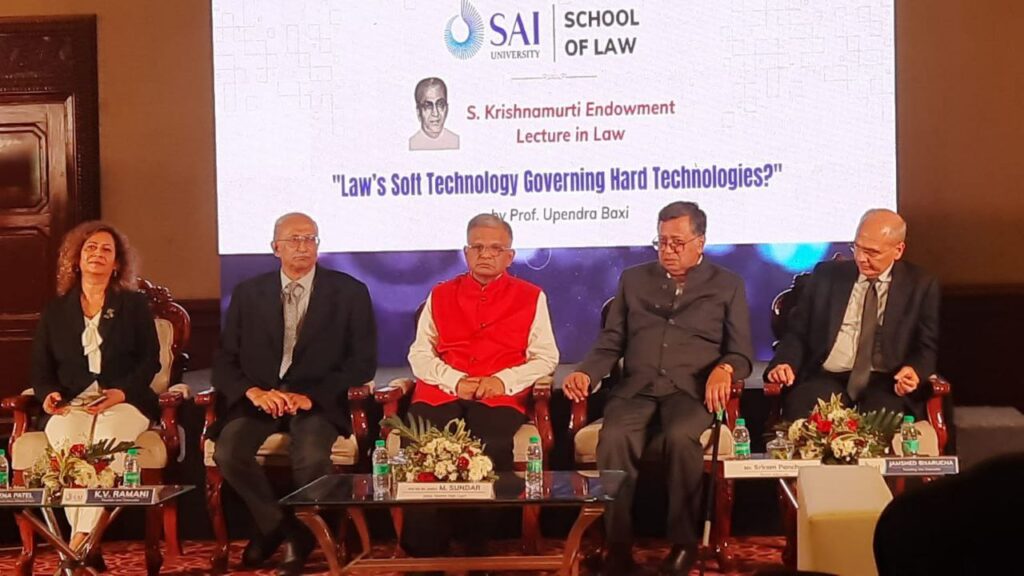
Prof. Upendra Baxi, renowned jurist and former Vice Chancellor of Delhi University delivered the first S. Krishnamurti Endowment Lecture in Law organised by School of Law, Sai University. The lecture titled ‘The Law’s Soft Technology governing Hard Technologies?’ explored the question whether law itself may be conceived as technology and if so what kind of technology it may be. He mentioned that the US Defence Department has, in an unconscious irony described ‘drones” — non-lethal automatic weapons systems, the first letters of which acronymise as LAWS! He found the idea of law as an ‘enterprise’ to subject human behaviour advocated by jurist Lon Fuller and the notion of ‘cultural lag’ propounded by sociologist Charles Ogburn compellingly relevant today in understanding law as technology.
‘The Fullerian idea of law as a normative enterprise has appeal because legislation, administration, interpretation, enforcement, the four domains of law, unite as risk-takers. Risks and trust in experts, epistocracy, as we now call it, are the defining marks of the old and the new modernity; and modern law is at the heart of the dialectical relation between the two. So, there is fun ahead in thinking about ‘soft’ technology of law still trying to regulate ‘hard’ ones,’ Prof. Baxi noted.
Justice M. Sundar of the Madras High Court was the Chief Guest and Advocate Sriram Panchu was the Guest of Honour. Mr. K. V. Ramani, Chancellor of Sai University, Prof. Jamshed Barucha, Vice Chancellor, and Prof. Reena Patel, Dean, School of Law also spoke on the occasion. The vote of thanks was delivered by Prof. M, V. Shiju, Deputy Dean, School of Law.
Sai University was founded with the Vision to establish India’s First International University. and is coming up in phases. Since inception, Sai University has been steadily growing in academic programs, faculty, curriculum, infrastructure and recognition. Sai University is being led by the Founder and Chancellor, Mr. K.V. Ramani, who is a prominent Entrepreneur and Philanthropist. The governing bodies of Sai University consist of eminent individuals from the business world, academia, government, and civil society from India and abroad. Some of the eminent members of Sai University board include Hon. Chief Justice Venkatachaliah Retd., N.R. Narayana Murthy, Sriram Panchu, Senior Advocate, Dr. Anil Kakodkar, Dr. K.P. Krishnan, IAS retd, Ms. Bharti Gupta Ramola formerly from PWC India, Ms. Suneeta Reddy, Managing Director of Apollo Hospitals and several other leaders. Prof. Jamshed Bharucha, Vice Chancellor of Sai University, is a Cognitive Neuroscientist and has served in prominent leadership roles in Dartmouth College, Cooper Union and Tufts University.
The School of Law at Sai University reflects the university’s vision and aspiration. Leadership of Sai University’s School of Law is provided by the Dean, Prof. Reena Patel who has over 30 years of experience from NLSIU and Warwick University. The universe of legal education is undergoing a tectonic shift. Law is becoming a data-driven and technology enabled domain, which pose several regulatory challenges. A result of this has been on the career path, skill sets, and domain knowledge that a lawyer requires. This change has been acknowledged and is reflected in the law school’s unique programs and offerings. The School currently offers a five-year integrated B.A. LL. B. (Hons.)program, one year LL.M. in Regulation and Governance, and a Post Graduate Diploma in Technology, Law and Policy.
The endowment lectures have been named after Late Sri. S. Krishnamurti, who was a gentleman and lawyer who practiced Company Law and Taxation Law in Madras High Court and in his law chambers with great expertise and elan. He was also a great humanist who helped everyone in need with pro bono counsel. Sri S. Krishnamurti also supported several students with scholarships for their education. The S. Krishnamurti Endowment Lectures in Law has been instituted by his daughter Dr. Vasantha Bharucha from New Delhi, with a generous grant, enabling these lectures to be organised every three months.


